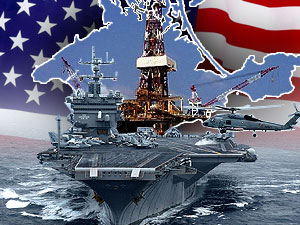09.04.2008
April 04, 2008 (the date of publication in Russian)
Maxim Kalashnikov
CRIMEA: A NEW KUWAIT, OR A NEW KOSOVO?
Oil and gas reserves off the Crimea coastline are instrumental for far-reaching geopolitical games
 A new nodus of potential disruption and confrontation is emerging in the Black Sea. The Crimean Tatar secessionist sentiment is amalgamated with the factor of oil and gas reserves on the sea shelf on both sides of the Crimean Peninsula.
A new nodus of potential disruption and confrontation is emerging in the Black Sea. The Crimean Tatar secessionist sentiment is amalgamated with the factor of oil and gas reserves on the sea shelf on both sides of the Crimean Peninsula.
Exploration of oil and gas deposits of the area started yet in the Soviet period. At present, given high fuel prices, extraction in this area is more profitable than in the 1980s. In her political program, entitled "Ukrainian Breakthrough", Yulia Timoshenko, current Prime Minister and would-be President of Ukraine, mentions the yet unused "Black Sea reservoirs".
According to our Crimean sources, a number of drilling platforms are already installed off the coastline. Tenders for feasibility studies were reportedly won by US companies. It is noteworthy that soon thereafter, a map of geological research, surfacing in Simferopol, estimated the capacity of the undersea reserves in an amount almost equal to that of the Persian Gulf deposits. The map displays voluminous concentration of hydrocarbons both on the shelf of the Black Sea to the south from the peninsula, and under the bottom of a shallow Azov Sea to the north. Azov Sea is crossed by the Russian-Ukrainian border, part of which is disputed for years.
The political implications of the "newly-discovered Kuwait of Ukraine" are pretty predictable. Similar games have been played for years around the Caspian, the amounts of local hydrocarbons being deliberately exaggerated to play upon the secessionist mood of the Caucasus peoples. Crimean Tatar secessionism has been one of the major playgrounds for undermining of the USSR since 1970s. At the same time, Panturkists viewed Crimea as a potential part of a revived empire.
The Crimean Tatar factor is a convenient instrument for both manipulating Ukraine and pressuring Russia, as ethnic tensions in the area, regardless from the immediate reasons, create a pretext for deployment of an international peacekeeping contingent in the area. In case US companies overtake the local hydrocarbon-extracting projects, this contingent is going to be used formally for protection of economic interests, similarly to the special force deployed from protection of the Baku-Ceyhan pipeline in Transcaucasia.
Ukraine's entry in NATO is supposed to create more favorable conditions for subsequent introducing "crisis management". A military conflict, like the first Chechen war, is not supposed to affect the oil extraction facilities. Under military protection of the NATO contingent, oil and gas, cheaply purchased from the war-undermined Ukraine, is going to be delivered to Odessa to be later shipped along the ready-built Odessa-Brody pipeline.
Two more countries, supposed to be involved in the related political games, are Turkey and Poland, interested in two rivaling routes of oil transit. Manipulating both and playing one ally against another, US strategists obviously intend thus to guarantee hegemonistic control not only over the Black Sea basin but over Western Europe, for which Ukraine serves as a major fuel transit link.
Transformation of Crimea into a quasi- independent entity under international protection has been already rehearsed on the Kosovo playground. The square of the territory, the number of the population and the target minority are quite similar. However, Crimea has got a great advantage: its natural havens are most perfect for naval bases. For that reason, Russian-Turkish contest for the area has traditionally involved interests of other military powers.
Number of shows: 2426
 ENG
ENG 

 ENG
ENG 
